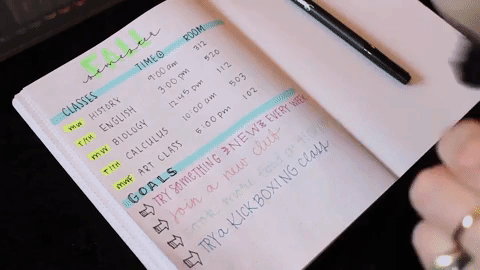Getting a good G.P.A is at the top of many New Year’s Resolution lists for 2018. Grades aren’t everything so please don’t stress out. But with a few adjustments in your attitude towards the semester, your grades can get a significant boost. Below are my top seven tips for getting a 4.0 this semester.
- Plan like a maniac
Anyone who knows me knows that I love paper products. I love planners, calendars, highlighters, gel pens, sticky notes, everything. Obviously, the most important aspect of owning paper products is actually using them. Before the semester starts, I like to sit down with my planner and my syllabus and write down all of the important dates. Do this in both the month-long plan and on the individual days. This way, you’ll be able to see the entire month and know where your semester is going. If any weeks are particularly saturated with deadlines, you can plan ahead to finish some of the work and decrease your stress levels as much as possible.
2. Take full advantage of the halo effect
For those of you who haven’t heard of it, the halo effect is the idea that by giving the professor the impression that you are a good student within the first few weeks, they’ll be more likely to give you a higher grade if they’re torn between two. It can be very helpful and often be the difference between an A and a B. So how can you give yourself this halo effect? The easiest, and most immediate way is to sit in the front row. This will not only keep you accountable, but it also means that no matter the size of the class, your professor will recognize you. Hopefully with a halo shining around your head.
3. Go to office hours
Office hours are probably the most underused resource on campus. Almost every professor will have office hours (it’s a requirement at many universities) so either look in your syllabus for their times or ask them after class. Studying hard and going to tutoring is great, but you need to be smart. The only person who knows what their expectations are for their class is the professor. The most important part of going to office hours is to go with a clear intention. Before you go, write down a list of questions you have about the class. Nobody likes their time being wasted.
4. Talk to the upperclassmen
These are the people who have boldly gone before you and suffered through the worst and triumphed with the best. Don’t be afraid to ask your upperclassmen friends for advice about which section of a class to take, or which class to take in general if you’re conflicted. The class really does make all the difference and knowing the tendencies of each professor can really give you a leg up.
5. Work smarter, not harder
Obviously, hard work is important. But working unnecessarily hard won’t help you. Your time is your most valuable asset and you need to understand the most efficient way to get through your coursework. This means, unfortunately, figuring out the best way to study for each class. If you’re taking a math class, doing an hour of practice problems will be much more effective than spending an hour reading your textbook.
6. Study to understand
Please realize that although the title of this article is How to Have a 4.0 Semester, the point of college is not getting incredible grades. Ideally, you’re in a major which somehow connects to the career you want to dedicate your life to. You need to know the material you’re being taught. Not just know it, but understand it. A good measure of whether or not you understand the material is your ability to explain it. Once you can teach it to someone, you’re there.
7. Do more than you’re asked
This a philosophy that should really be applied to everything you do in life. If the professor sets an expectation, meet that expectation but do something a little extra. Make your work engaging and insightful. So often, getting work done is a mental game, so if you spin the topic into something that matters to you, this will shine through in the finished product. Of course, there is the caveat that if a page limit is set, stay within that page limit. The professor doesn’t want to read ten pages on a topic when they were expecting five.























